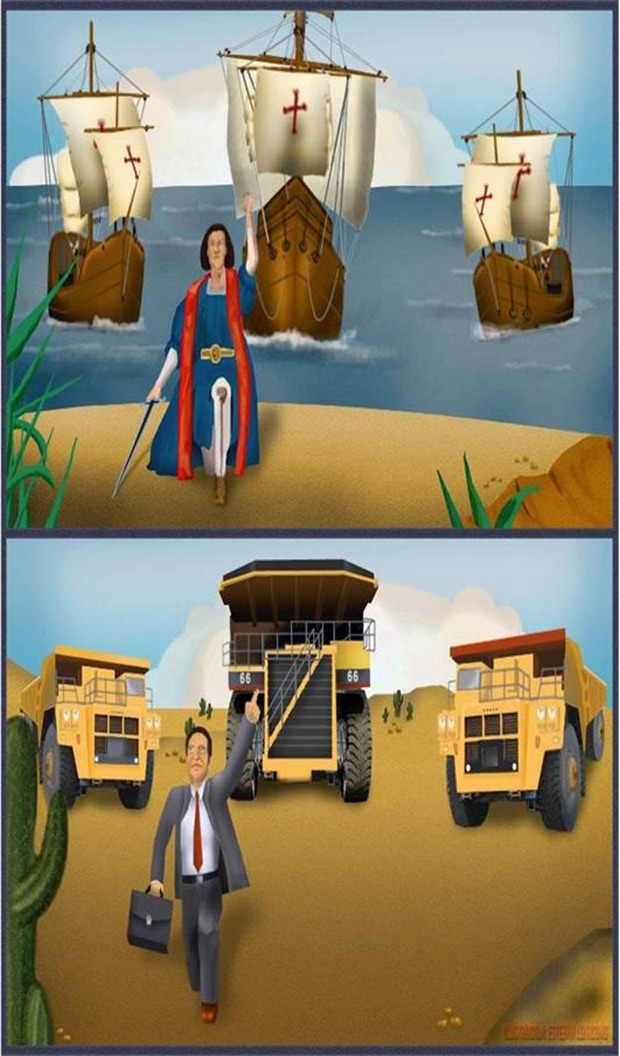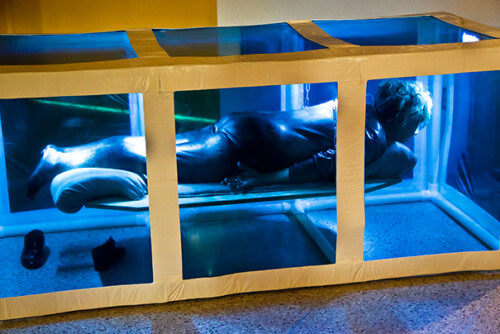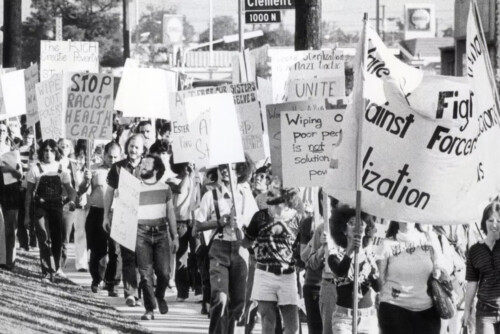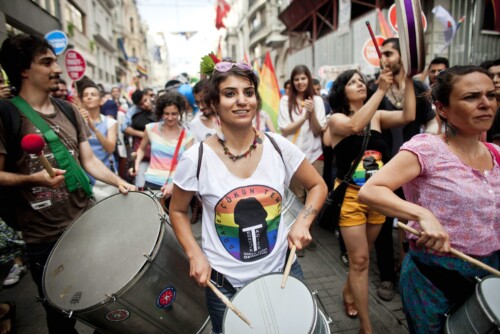Balancing Accounts and Neocolonial Alchemy: Gold into Scrap, Food into Poison, Addition into Division
This was a blow. An activist at Madre Selva said, “It seems like people are just ready to give up on San Miguel, it’s a sacrifice zone. One that shows the enormous power the mine has, once it’s installed. Even though many people there still want to have their consulta, 1 the national organizations have decided it’s too dangerous. We don’t think it could pass and that would be devastating to the larger movement. It’s too bad. Many people there are feeling abandoned.”
The court, however, is still examining the original complaint regarding proper prior consultation, which is where the consulta numbers come back into play, arrayed against the company’s arsenal of “counter”-tactics which claim, first, to have already counted, and second, that the consulta numbers are more uncertain than they appear. 2 These accounting labors occur within (and simultaneously produce) transnational and national contexts in which “good faith consultations” and sustainable development are weighed against the political, economic, and legal powers of the mining concession, and in the most local and intimate spaces in which people contemplate life chances. How do you balance—without particularly accurate information—quetzales to cuerdas of land, wages to labor, hopes for progress, development, and the “will to improve,” to war’s devastation and the impossible existing relations of production? 3 How to calculate the possibilities of the mine with experiences like going “to the coast to harvest and you leave here strong but when you come back you and your children are sick,” or sending a “son to the US but there’s no work. We borrowed 12,000 quetzals but with interest it became Q60,000”? Even as the consultas become modular and transferable from Sipakapa to El Mirador to Santa Cruz del Quiché, the company (also infinitely better funded) has its tried and true mechanisms for leveraging such uncertainties, its sometimes brutal, sometimes suave (subtle) efforts to penetrate and divide communities, luring people to count on its side.
In my notebook’s pages, the rapid personal shorthand of words twine around inexpert drawings of animals in several different hands. As I sit in my kitchen on a rainy October afternoon rereading them, I’m transported back to the hot afternoon of their writing, sitting on a stump half in the shade with two children leaning on me, one half out of her mother’s lap as we entertain each other and I listen to testimonials about the mine. Thirty international antimining activists, organized by the Belgian NGO CATAPA, are crowded on benches in Salomon’s “garage,” a rather rude structure, in San José Ixcaniche, one of the villages closest to the mine. Salomon is telling us the story of the mine, and I will tell you again, briefly, because its tale of a once-balanced exchange turning into betrayal evokes older expressions of the painful duplicity of conquest and focuses us on my third form of counting as life technology—as accounting of cost vs. benefit, profit vs. loss, “human economy” vs. extraction and exploitation. 4
When Montana first came in, Salomon said, “it was easy, suave, sencillo [soft, simple], with people just like us. They made us food, to attract the people. We played futból, they killed animals, so we had a big cook-out. They had raffles for bicycles and other gifts. People felt happy and fell in with the plans. There would be work, an orchid farm, así de suave. It turned out it was not about flowers, but no one was sure what it was about, maybe minerals. They took some rocks, and started talking about buying land where the mountain was. One of our neighbors sold, he was excited about the money. Then gringos started to come, with machines. One day they offered me work, they needed someone who could read and write, to give information to people. They taught me. Here will be work, gold and silver, but this wasn’t until 2003, and they started coming in 1996. That’s when we discovered what it was.”
“For two and a half years I worked with them, speaking what they said, but in 2005 they brought an engineer from Zacapa [a majority ladino area of Guatemala, renowned for its machismo] and he ruined things. We were working as brothers, tranquilo, but he started firing people. I walked all over these mountains for them, to talk, to tell people this was development. But with him there was no longer compañerismo. ‘Your opinions are not important to the company,’ they said, ‘we have to cut costs.’ In 2007 people tried to have a meeting for better wages, for more money for the land they’d sold. I worked for the company but I said, the people can do what they want. Just for respecting my neighbors they fired me. The neighbors blocked the roads, they wanted a dialogue. People went in tranquilos and left the same way, but the company tried to provoke them. They sent the security up here, they provoked us. They shot at people, hit people. And then they said that we hit them. They claimed we hit the gringo John Noyes. They said we hit him on the head! How could that be? He is so tall and people here are so small! And he was armed!!! It was a public road, but he grabbed me and accused me, said I was trying to kill him, wrote up a complaint and sent it to the district attorney. The authorities only care about people with money. In the countryside, you can just die.”
For two years Salomon and six other people from the demonstration were under house arrest, wrapped up in expensive court cases accused of inciting violence, threats, and damage to property and person. COPAE’s legal arm supported them and in the end, five were found not guilty and two had to pay fines.
“Now there are serious problems in the community. We are very divided. Some of our neighbors don’t want anyone to talk against the company. At a meeting yesterday a man tried to talk about the rashes he and his children have. The health center says there’s nothing they can do. But the people turned on him, they were angry. They want to make a rule that no one can say anything bad about the company. Now our lives are no longer tranquilo. Now I only trust my own family.”
It was those “big cook-outs,” the apparently stringless gifts from the company, which ended up counting against the people of San José Ixcaniche. Although Goldcorp is the third largest mining company in the world and profitable enough to pay its chairman over $23 million dollars in salary, they obtained a $45 million loan from the World Bank to begin operations in Guatemala. 5 The World Bank, under activist pressure for accountability and responsiveness, now requires the companies it funds to show they consulted people about the project. 6 By 2003, when the company began its presentations on the benefits the mine would bring, many people were already accustomed to the postwar NGO practice of providing food in return for signing in. People who attended the cookouts signed lists that were then presented as proof that people accepted the company.
Salomon’s anguish at the end of compañerismo after he “walked all over these mountains for them, to tell people this was development,” echoes another tale of trust betrayed, a seeming equal relation exposed as violently unbalanced, all the suffering and liability falling on one side of the equation: Caliban’s lament from Shakespeare’s Tempest:
When thou camest first Thou strok’st me, and made much of me; wouldst give me Water with berries in’t, and teach me how To name the bigger light and how the less That burn by day and night; and then I lov’d thee And show’d thee all the qualities o’ th’ isle, The fresh springs, brine pits, barren place and fertile. Curs’d be I that did so! All the charms of Sycorax toads, beetles, bats light on you! For I am all the subjects that you have, Which first was mine own king, and here you sty me In this harsh rock, whiles you do keep from me The rest o’ th’ island. 7

Four hundred years later, in the crowded women’s meeting, Vinicio reminds us: “They are not a proyecto. They didn’t come here to bring you water and health. It’s an industry. They took out 240,000 ounces of gold last year. That is worth about $125 million. One ounce of gold is worth more than Q8000. They are here to make money, nothing else. If they want your land they will take it. They are not here because you are poor and they want to help you.” He did acknowledge that work in the mine pays well (and regularly), as most men make about Q1500 a month ($180)—an enormous amount in a place where there are almost no salaried jobs, and at a time when work in the United States is drying up—but he also said that in Canada or the United States they would have to pay much more because the work is so dangerous that no one wants to do it. “They earn the same regardless of how much they pay, so they make a lot more money here where workers are so cheap.” And that’s the rub, as the song says, “Poor people are easy to buy.” He also told us that over one-third of the entire country is already ceded for exploration, with 23 licenses in the municipality of San Miguel alone. “Almost all the mines are where indigenous people are.” And he outlined other costs: the mine pays only 1 percent royalties and no sales, income, or import taxes. 8 Guatemalan taxpayers foot the bill for the police and army guarding the mine, although it has private security as well.
The mine-workers who had marched on the church in June 2009 accusing Hermana Maudilia and other activists of trying to take away their jobs are probably being used, like the “teabaggers” in the United States, but there is real fear about the dearth of alternatives in the area. The company, even as it seems to be able to do whatever it wants, like just taking the land of holdouts or getting court orders on trumped up charges (not to mention whoever is issuing threats, cut off Pedro Cinto’s head, and shot Diodora), has also assiduously courted individuals and communities. In Sipakapa a man said, “We were very united but now not so much. A lot of people have turned out to be for the mine. The big thing they did in our hamlet was install computers at the high school, so now the director is very pro-mine and he has pulled all the students and their parents. It’s hard now. There are only about four of us in the resistance.” On the same July day as the antimining demonstration in San Miguel, the company sent an engineer, “all dressed up, in a tie and coat, with his nice car. He went out to talk to people, giving little gifts, saying there was no pollution, there was no problem, reminding them of all the help the company gives. It impresses people. And they did it on the same day! They are working all the time to undermine us, but we do our politics when we can, because we have to work and take care of our children.” The company had also apparently started rumors that it had given the church and its radio station half a million quetzals. “As if!” said a catechist-DJ. The company also astutely argues that activists “eat off the mine,” through the money they get from international NGOs.
It’s hard to measure what is going on, causes and effects, but local people know for sure that the bonds of trust and community solidarity are breaking (while national and international activists tend to focus on environmental damage and human rights violations, local denunciations of mining always list community divisions first on the list of pernicious effects). Many are also pretty certain that people are being bought off. Some for the wages; they will talk well of the mine (as Saloman had before his disillusion). Or the mayor of Sipakapa, who had to be forced to sign off on the consulta, “because he was bought by the mine,” said one man. “How much did he cost?” I asked. “Maybe a million, mayors are expensive. But up in the villages, it’s cheaper, 1,500 or even just 500. That’s a lot for us, but not for them.”
About three hours into the Sipakapa meeting with COPAE on alternative development, a rumor flew around the room that one of the antimining leaders was not there because he was at a meeting the mine had called to set up coffee production. People freaked out. Several immediately denounced him as sold out while others tried to reason that he had just gone to check it out, as leader of their own coffee cooperative. People got more and more agitated until suddenly the man appeared. He was relaxed and smiling and explained he had gone as a spy and was now happy because the company’s project was pathetic compared to theirs. He’d been afraid, but now he knew what was going on. It took him, a long-term leader of the resistance, about half an hour to reassure people.
Aniseto denounced similar rumors at the demonstration: “Today they are saying that the mine has bought me […] but my life is not worth a million quetzals if I and my people are sick.” People may not be sure how exactly to measure all the effects of the mine, but they know things have changed. They are not the friendly, happy communities they once were. “There are lots of conflicts.”
On the bumpy car ride to Sipakapa for the workshop, Hermana Maudilia and three catechists talked about changes the mine has wrought. Simón said, “I am not a moneda de oro (gold coin) so that everyone loves me. But it is sad. There are many divisions now. We used to all get along, to joke. We had really good times with people in city hall, with everyone. But not now. People won’t respond when I greet them.” He told how he’d recently gone to a restaurant in San Miguel with some COPAE people and how a guy came up to their table, a guy who is with the mine. “We know him, but that cabrón pulled out his wallet, all this money and he was hitting it on the table. Bang, bang! (he was acting this out). ‘I have money and so I don’t have to worry about anyone coming to get me. I can do what I want.’ Cabrón, amenazando, that asshole, trying to threaten us!” They laughed. But then Leonel said, “People stay quiet, they’re very careful. They do not want to say anything. They remember the war. They are afraid it might happen again.”
But just as things got rather somber, Simón, smiling mischievously, pulled out a digital recorder and played a fake ad for Montana “Explotadora” (exploiter, not explorer) that communications students at the university extension in San Marcos had made. Perfectly miming the original’s aurality with colloquial “person on the street” interviews and a male voice-of-god narrator mixed with traditional marimba music, we hear a little girl say “My daddy works in the mine and now, thanks to Montana Explotadora, I have two heads!” Then a woman’s voice: “my husband works in the mine and now he has three penises. Awesome!” They weren’t sure they could play it on the church’s radio station (where Simón is a DJ) but we all thought it was a hoot.
Counting does the special work of making visible what was “already there,” but it also produces what it seems to simply show. The consciousness-raising and ant-like efforts over years to organize a consulta help create the very resistance the consulta counts. One of the ways it does this is by challenging official equivalences with alternative calculations of worth, as in the song where “A gram of blood is worth more than a thousand kilos of gold.” Aniseto, in his speech, suggested a new Hilux and going around with two or three women may look sweet at first, but becomes less so when your health is in danger. In the workshop, a man explained that the mine offers false promises of progress. “They say there is work, but there’s not enough for everyone, while everyone has problems with their crops, their children’s health, miscarriages, poisoning. Maybe those with work can save or earn enough to get their Q80,000Q little car, but they don’t see it just requires more spending on tires, parts, gas—they are spending and spending. It will never stop.” And more creepy, what happens to what really counts about a person when they come to resemble commodities that can be bought and sold? When “authorities only care about people with money. In the countryside, you can just die.” Progress does not equal respect. Adding some money does not balance out divisions in “my people.”
- A number of hamlets have counted themselves and the no votes have won, but the municipality as a whole, including the town center, has not voted.[↑]
- Katherine Fultz (personal communication) says, “This is actually really complicated […] and some linguistic issues are tangled up with the legalese, in my opinion. The World Bank requires “consultation” (i.e., not “consent”[…] contrary to the recommendations of their own Extractive Industries Review) which for them can be “informational meetings,” in which community members are asked their opinions, or even (as in the case of Marlin) leaving the Environmental Impact Assessment in the department capital and waiting for community members to drive there, read it, and offer their opinions (which, of course, is hilarious to anyone who has actually been to the region). In a strictly technical sense, Glamis/Montana/Goldcorp seems to have complied with the World Bank’s requirements. But, of course, the spirit of the law is something else.” See also Fundación Rigoberta Menchú and Tz’ikin, Diagnóstico sobre el ejercicio del derecho a la consulta que tienen los pueblos indígenas y sus consecuencias jurídicas y políticas, a partir del caso de la explotación minera en el departamento de San Marcos, (Guatemala: Fundación Rigoberta Menchú, 2008).[↑]
- Tania Li, The Will to Improve, (Durham: Duke UP, 2007).[↑]
- David Graeber, Debt: The First 5,000 Years, (Brooklyn: Melville House, 2011): 387. The latter is so perverse it urges us to “see our life itself as something we hold on false premises, a loan long since overdue, and therefore to see existence itself as criminal.”[↑]
- Luis Solano, Guatemala: Petróleo y minería en las entrañas del poder, (Guatemala: Inforpress Centroamericana, 2005); NISGUA (Network in Solidarity with the People of Guatemala), “Mining Expansion and the Communities that Say NO,” newsletter, 2008.[↑]
- And it has to be transparent about environmental impact, which is why some of these numbers are available, unlike in the United States for communities facing hydraulic fracturing for natural gas (fracking). As Royte 2012 describes: “Given the absence of studies … inadequate inspection and scant traceability in the food chain, it’s hard to know what level of risk consumers face” (17). “Information about quantities and concentrations of [fracking] chemicals remains secret, as do compounds considered proprietary” (15). And people aren’t talking: “Some receive royalty checks […] some have signed nondisclosure agreements after receiving a financial settlement, and some are in active litigation” (15). Some fear “retribution from community members with leases; others don’t want to fall afoul of ‘food disparagement’ laws or get sued by an oil company for defamation (as happened with one Texan after video of his flame-spouting garden hose was posted on the Internet. The oil company won; the homeowner is appealing)” (17). In other words, it’s not just those pobrecitos in Guatemala! Without mobilizing to count, life will have fewer and fewer safe spaces.[↑]
- William Shakespeare, The Tempest, (New York: W.W. Norton Co., 2003[1610]): 1.2.[↑]
- Responding to the enormous pressures brought by the consulta movement, in 2012, Goldcorp agreed to “voluntarily” increase royalties to 4 percent of gross revenue. Under Guatemala’s military, but far more nationalist, governments of the 1960s, transnational mining companies were forced to pay taxes on 53% of their profits. Luis Solano, Guatemala: Petróleo y minería en las entrañas del poder, (Guatemala: Inforpress Centroamericana, 2005): 35. Compare to today’s neoliberal world in which even feisty Venezuela only gets 13% royalties.[↑]



